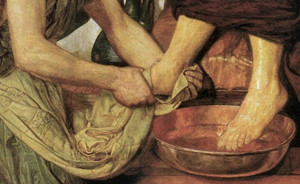All three of the Liturgical Readings for this week focus specifically on the notion of service and ministry. There is enough in the passage from Acts to remind us of how far we still are from being the community Christ intends us to be. In our second reading, Peter calls each of us to look at ourselves. He reminds us of the dignity of our call to service and the dignity of the community to which we are called to serve. Today's Gospel is a scene from the Last Supper. Scripture tells us that Jesus did two things that night which define the sacramental nature of "service." He commissioned his disciples to bring His healing power of forgiveness, allowing us to reconcile ourselves with one another and with God and He showed by example what it means to be compassionate and to minister to one another.
From its earliest moments, the Christian community was asked to select some of its own members for the ministry of service, so that the apostles could concentrate on prayer and the ministry of the word. (Acts 6:4) This fits a pattern for the early church. The priests would serve the community by being persons dedicated to prayer, teaching and presiding at Eucharist. Members of the laity, both men and women would take ownership of the other aspects of their community life.
A ccording to scripture scholars, the First Letter of Peter was written between 70-90 A.D. to the Christian communities located in five provinces in Asia Minor, and addresses the difficulty of living the Christian life in a hostile, secular environment that upholds different values and subjected the Christian community to ridicule and oppression. The author reminds the people to let themselves "be built into a spiritual house, to be a holy priesthood to offer spiritual sacrifices acceptable to God through Jesus Christ." And he assures them that they are "a chosen race, a royal priesthood, a holy nation, a people of his own."
ccording to scripture scholars, the First Letter of Peter was written between 70-90 A.D. to the Christian communities located in five provinces in Asia Minor, and addresses the difficulty of living the Christian life in a hostile, secular environment that upholds different values and subjected the Christian community to ridicule and oppression. The author reminds the people to let themselves "be built into a spiritual house, to be a holy priesthood to offer spiritual sacrifices acceptable to God through Jesus Christ." And he assures them that they are "a chosen race, a royal priesthood, a holy nation, a people of his own."
The Second Vatican Council gave us the opportunity to rediscover this original model of church. More and more lay men and women have been invited to use their gifts and charisms for the service of the community of believers. More and more, the laity understands that they are the Church. Ordained clergy, priests and deacons, along with religious men and women, do have special roles within the community, but they are servants, and they alone are not the Church. We have come to understand that our faith rests not in the organization that we call "church" but in the Person of Jesus who gathers this community - this church - together.
Jesus is "the way" to God. Instead of all the legalistic observances that religious leaders insist upon in order for people to get right with God, believing in Jesus takes us into God’s grace-filled presence. In truth, Jesus had little interest in religion at all, or in the trappings of it. His passion is for the utter authenticity of people's lives and His way of loving is also the way for us to live.
He is "the truth" we can trust. He has taught us about God’s nature and we trust what he has said about God’s abundant mercy and forgiveness for us is true. If someone preaches another “truth” about a harsh, avenging and exacting God, we ought to reject that message. Instead, we trust that Jesus Himself is the truth about God. And living Jesus’ life will be how we become what God intended for us.
He is "the life" that we share. Jesus is not just a model on which we base our lives. Rather, he is "the life." When he tells his disciples, "I am going to the Father," he promises that he will come back to take them to himself. As we approach Pentecost we yearn again for the Spirit that Jesus promised will take us to himself, unite us with himself and empower us to live the life he lived. This Spirit is his life for us and it quickens our own spirits, enlivening us so we can proclaim that his is "the life" that is now within us.
Today's narrative ends with Philip, who speaks one famous sentence recorded for all time: "Lord, show us the Father, and that will be enough for us." These words sum up the entire purpose and direction of the human journey. They articulate the basic longing of our hearts to see God, to know Him, to love Him and to serve Him. They reflect the longing of those whose spiritual needs are met in the church and those whose needs are not. Philip speaks for all of us when he says to Jesus: "We really only need one thing - to see God. Show us how to do that, and that will be enough!"
Jesus answered with words that are equally critical for us: "Have I been with you for so long a time and you still do not know me?"





